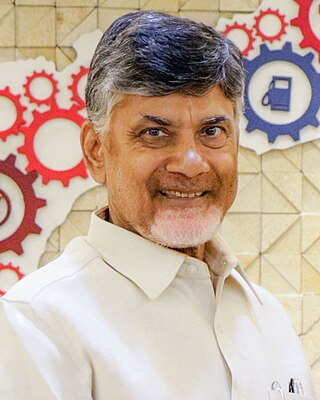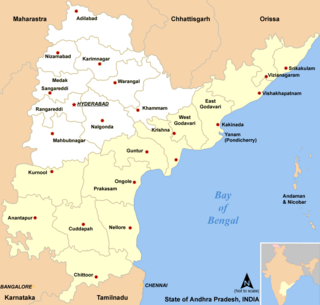Related Research Articles

Andhra Pradesh is a state in the southern coastal region of India. It is the seventh-largest state with an area of 162,970 km2 (62,920 sq mi) and the tenth-most populous state with 49,577,103 inhabitants. It has shared borders with Chhattisgarh, Odisha, Karnataka, Tamil Nadu, Telangana and the Bay of Bengal. It has the second-longest coastline in India at about 974 km (605 mi). After existence as Andhra State and unified Andhra Pradesh, the state took its present form on 2 June 2014, when the new state of Telangana was formed through bifurcation. Amaravati is the capital of the state, with the largest city being Visakhapatnam. Telugu, one of the classical languages of India used by the majority of people, is the first official language.
Kamma is a Hindu caste from South India. The community of Kammas is believed to have originated from agriculturists of the Kammanadu region of the erstwhile Guntur district and Ongole division in Andhra Pradesh. Propelled by their military activity in the Vijayanagara Empire, Kammas are believed to have spread out from the region during the Vijayanagara period, followed by some in-migration during the British period and out-migration again during the twentieth century. Today they are regarded as the richest group in Andhra Pradesh and are a dominant caste from Coastal Andhra with socio-economic and political prominence throughout the Telugu-speaking regions of India.

Nara Chandrababu Naidu, also known as Chandrababu Naidu or CBN, is an Indian politician and the current Leader of Opposition in the Andhra Pradesh Legislative Assembly. He also served as Chief Minister from 1995 to 2004 and as Opposition Leader from 2004 to 2014 of Andhra Pradesh. He is the National President of the Telugu Desam Party (TDP). He suffered a major political set back in the 2019 Andhra Pradesh Legislative Assembly Elections where he won only 23 seats out of the total 175 seats.

The Telugu Desam Party is an Indian regional political party with great influence in the states of Andhra Pradesh and Telangana. It was founded by the former chief minister of Andhra Pradesh N. T. Rama Rao (N.T.R.) on 29 March 1982 and has focused on supporting Telugu speakers. The party has won a five-time majority in the Andhra Pradesh Legislative Assembly and has emerged as the most successful political outfit in the state's history. It is currently the main opposition party in the Andhra Pradesh Legislative Assembly.

The Bharat Rashtra Samithi, formerly known as Telangana Rashtra Samithi, is an Indian political party which is predominantly active in the state of Telangana and currently the primary opposition party in the state. It was founded on 27 April 2001 as by K. Chandrashekar Rao, with a single-point agenda of creating a separate Telangana state with Hyderabad as its capital. It has been instrumental in carrying forth a sustained agitation for the granting of statehood to Telangana.

Telangana is a landlocked state in India situated in Southern part of the Indian peninsula on the high Deccan Plateau. It is the eleventh-largest state and the twelfth-most populated state in India as per 2011 census. On 2 June 2014, the area was separated from the northwestern part of Andhra Pradesh as the newly formed state of Telangana, with Hyderabad as its capital.

Rayalaseema is a geographic region in the Indian state of Andhra Pradesh. It comprises four southern districts of the State, from prior to the districts reorganisation in 2022, namely Kurnool, Anantapur, YSR and Chittoor. Four new districts were created from these, namely Sri Sathya Sai, Nandyal, Annamayya and Tirupati. As of 2011 census of India, the western four districts of the region had a population of 15,184,908 and cover an area of 71,060 km2 (27,440 sq mi).
Reddy is a caste that originated in India, predominantly settled in Andhra Pradesh and Telangana. They are classified as a forward caste.
Deshmukh (IAST:Dēśamukh), is a historical title conferred to the rulers of a Dēśamukhi. It is used as a surname in certain regions of India, specifically in the states of Maharashtra, Karnataka, Telangana Andhra Pradesh and northern parts of Madhya Pradesh and Gujarat, Goa whose family received it as a title.

Indian feudalism refers to the feudal society that made up India's social structure until the formation of Republic of India in the 20th century.

Madiga is a Telugu caste from southern India. They mainly live in the states of Andhra Pradesh, Telangana and Karnataka, with a small minority in Tamil Nadu. Madigas are historically associated with the work of tannery, leatherwork and small handicrafts. Today, most are agricultural labourers. They are categorized as a Scheduled Caste by the Government of India. Within the Madiga community, there are various sub-castes include Bindla, Chindu, Dakkali and Mashti. Madigas have their own classes, the priestly class is known as Madiga Dasari. The Sangaris, Thothis, etc. have different works for their community.
The Telangana Rebellion, natively known as Telangana Sayudha Poratam, was a communist-led insurrection of peasants against the princely state of Hyderabad in the region of Telangana that escalated out of agitations in 1944–46.
The Bhoodan movement, also known as the Bloodless Revolution, was a voluntary land reform movement in India. It was initiated by Gandhian Vinoba Bhave in 1951 at Pochampally village, Pochampally.

Suddala Hanmanthu was a noted Indian poet of the mid 1900s. He wrote songs like Palleturi pillagada... pasulagaase monagaada....

The Telangana movement refers to a movement for the creation of a separate state, Telangana, from the pre-existing state of Andhra Pradesh in India. The new state corresponds to the Telugu-speaking portions of the erstwhile princely state of Hyderabad, which were merged with Andhra Pradesh in 1956, leading to the Mulki Agitations.

Srikrishna Committee on Telangana or the Committee for Consultations on the Situation in Andhra Pradesh (CCSAP) is a committee headed by Justice B. N. Srikrishna to look into the demand for separate statehood for Telangana or keep the State united in the present form, Andhra Pradesh. The committee was constituted by the Government of India on 3 February 2010 and submitted its report on 30 December 2010 to the Ministry of Home Affairs.
Baddam Yella Reddy was an Indian communist politician from Telangana. He was one of the prominent leaders in the Telangana armed struggle against the Nizam regime.

The history of the Telangana movement refers to the political and social conditions under which the Telangana region was merged with Andhra State to form the state of Andhra Pradesh and the subsequent demands to reverse the merger to form a new state of Telangana from united Andhra Pradesh.

The history of Telangana, located on the high Deccan Plateau, includes its being ruled by the Satavahana Dynasty, the Kakatiya Dynasty (1083–1323), the Musunuri Nayaks (1326–1356), the Delhi Sultanate, the Bahmani Sultanate (1347–1512), Golconda Sultanate (1512–1687) and Asaf Jahi dynasty (1724-1950).
The Srikakulam peasant uprising occurred from 1967 to 1970, in Srikakulam district, Andhra Pradesh, India. The Naxalbari uprising at the beginning of the Naxalite movement during the 1960s inspired the upsurge.
References
- 1 2 "Gadar to release book on Telangana - ANDHRA PRADESH". The Hindu . 9 January 2008. Retrieved 18 September 2016.
- ↑ "'Aristocrats part of the Freedom Struggle'". Deccan Chronicle . 18 July 2020 – via PressReader.
- ↑ "India News, Latest Sports, Bollywood, World, Business & Politics News". The Times of India . Archived from the original on 5 November 2012. Retrieved 18 September 2016.
- ↑ "Untitled". svc.ac.in. Archived from the original on 22 May 2011. Retrieved 17 January 2022.
- ↑ I. Thirumali (29 February 1992). "Dora and Gadi: Manifestation of Landlord Domination in Telengana". Economic and Political Weekly . 27 (9): 477–482. JSTOR 4397664.
- ↑ "'KCR mortgaging Telangana issue' - ANDHRA PRADESH". The Hindu . 3 February 2009. Archived from the original on 7 February 2009. Retrieved 18 September 2016.